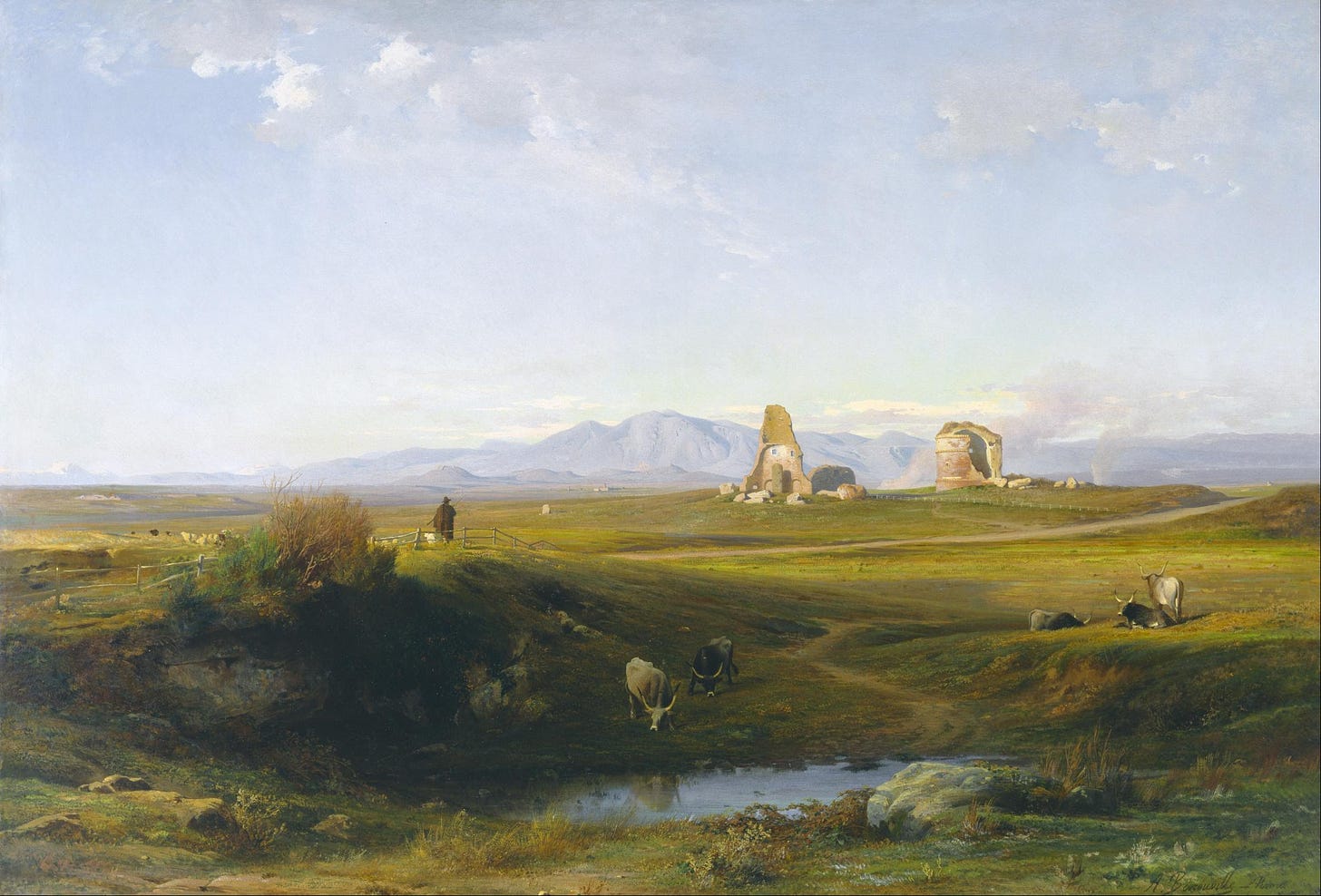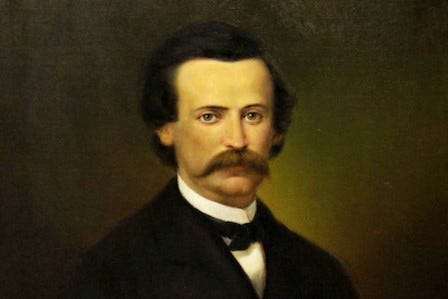
A theme runs through a lot of poetry — and through even more prose: the theme of self-help books, ads for athletic shoes, and the exhortations of cheerleaders for the active life. “Let us, then, be up and doing,” as Longfellow put it in 1838, “With a heart for any fate; / Still achieving, still pursuing,” and on and on. “Act, — act in the living Present! / Heart within, and God o’erhead!”
There’s another theme, however, that poetry contains: the theme of living small. “Happy the man, whose wish and care / A few paternal acres bound,” as the very young Alexander Pope declared in 1701, “Content to breathe his native air, / In his own ground.” For Pope it was mostly a well-worn poetry pose (dating back at least to Horace’s similarly posed retreat from urban Rome to his Sabine farm), and the young Pope would go on to lead as public a life as anyone in his time.
That theme of stripped-down simplicity wouldn’t die. It’s in Thomas Gray’s 1751 “Elegy Written in a Country Churchyard.” And Emily Dickinson’s “How happy is the little stone / That rambles in the road alone,” because it “doesn’t care about careers, / And exigencies never fears.” It’s in Henry David Thoreau’s 1854 Walden, of course, and even Lynyrd Skynyrd’s 1973 rock anthem “Simple Man”: “Be a simple kind of man. / Be something you love and understand.”
Bene vixit, bene qui latuit: “He lives well who is well hidden” (a tag adapted from Ovid that Descartes took as his motto while not, in fact, remaining well hidden from the public gaze). Il faut cultiver notre jardin, “We must cultivate our garden,” as Voltaire concludes Candide. But that mention of Lynyrd Skynyrd prompts the thought that this may be a theme more typical of Southern art than the art of other American regions. It runs through the localism of the Fugitive Poets who evolved into the Southern Agrarians in the 1920s and 1930s: John Crowe Ransom, Robert Penn Warren, Donald Davidson, Allen Tate, Richard M. Weaver, Caroline Gordon, and all the rest. And it appears before the Civil War in the South Carolina coterie of John Dickson Bruns, the classicist Basil Gildersleeve, William Gilmore Simms, and the author of Today’s Poem, Henry Timrod (1828–1867).

Like Sidney Lanier (1842–1881), Timrod is more neglected these days than he deserves, in part simply because he was a Southerner — and more than just a Southerner: a loud proponent of Southern secession, dubbed “The Poet of the Confederacy” after one of his poems was read aloud at the first meeting of the Confederate Congress in 1861. His “A Cry to Arms” and “Carolina” are examples of his strident Confederate verse: “At last we are / A nation among nations.”
In Today’s Poem, however, he looks in the other direction, against the up-and-doingness of the 19th century. “I hold no creed so false / As that which dares to teach that we are born / For battle only.” Yes, he agrees, “There is a wisdom that grows up in strife,” but there is another wisdom (and “I like it best,” he writes) “that sits at home.”
So come! a lonely house awaits thee!
. . . come! and we will build
A wall of quiet thought, and gentle books,
Betwixt us and the hard and bitter world.In blank verse (unrhymed lines of five stresses), Timrod lays out the blessings of the quiet life, with its small ambitions and small actions. Its calmness and its hiddenness. Its simplicity. Timrod’s poem was a welcome reversal of his blaring public poems in the 19th century. And so maybe, when read today, “Retirement” can remind us that poetry has always allowed the rejection of busy striving, political ambition, social activism — refusing the demand to be up and doing, always up and doing.
Retirement
by Henry Timrod
My gentle friend! I hold no creed so false As that which dares to teach that we are born For battle only, and that in this life The soul, if it would burn with starlike power, Must needs forsooth be kindled by the sparks Struck from the shock of clashing human hearts. There is a wisdom that grows up in strife, And one — I like it best — that sits at home And learns its lessons of a thoughtful ease. So come! a lonely house awaits thee! — there Nor praise, nor blame shall reach us, save what love Of knowledge for itself shall wake at times In our own bosoms; come! and we will build A wall of quiet thought, and gentle books, Betwixt us and the hard and bitter world. Sometimes — for we need not be anchorites — A distant friend shall cheer us through the Post, Or some Gazette — of course no partisan — Shall bring us pleasant news of pleasant things; Then, twisted into graceful allumettes, Each ancient joke shall blaze with genuine flame To light our pipes and candles; but to wars, Whether of words or weapons, we shall be Deaf — so we twain shall pass away the time Ev’n as a pair of happy lovers, who, Alone, within some quiet garden-nook, With a clear night of stars above their heads, Just hear, betwixt their kisses and their talk, The tumult of a tempest rolling through A chain of neighboring mountains; they awhile Pause to admire a flash that only shows The smile upon their faces, but, full soon, Turn with a quick, glad impulse, and perhaps A conscious wile that brings them closer yet, To dally with their own fond hearts, and play With the sweet flowers that blossom at their feet.




Thanks again. I'll save this one.
You choose such beautiful art work, and perfectly suited to each poem. It adds enormously to the whole experience. Thank you!
Elizabeth